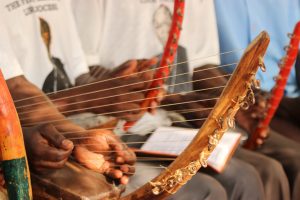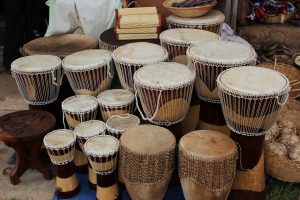There was a theme today that seemed to appear serendipitously, and that was the relationship between music and war.
I wrote an essay once about the focus on music during wartime, and the main thesis that I came upon was that music plays a healing role when it comes to periods of war and conflict.
During my trip to Uganda last year, I learned quite a bit about the curative elements of music. In Uganda, music was used as a way to bring soldiers back from the Bush, to protest the conflict that had ended several years ago, and as somatic method of transforming the pain of war.
Art, it seems, can be a beautiful expression of pain. Vincent Van Gogh used art as a way of transforming his pain into beauty. The people of Uganda used it as a way of expressing their pain. The Irish during the Famine used it as a reminder of who they were as a people during this painful period. Music, by nature, is a way for the more mysterious parts of our mind to overcome, transform, and reconcile pain.
During breakfast today, the topic of anti-war ballads came up. Within minutes, we were listening to beautiful anti-war songs including And the Band Played “Waltzing Matilda” by Eric Bogle, as well as I Can’t Write Left-Handed. Both these songs talk about the consequences of war to those who go to fight, and the senselessness involved in it. Both however have an air of optimism, calling to mind images of a world without war and without the violence and pain of conflict.
After breakfast, we saw a movie called “The Sapphires” about four Aboriginal Australians during the 1970’s who have the opportunity to perform for soldiers during the Vietnam War. Although rough around the edges in its struggle to find a balance of drama and comedy, the film works to depict both the internal and external struggles of the Aboriginal woman and the racist atmosphere they are forced to conflict with, paralleling the theme of music as a relief during the Vietnam War. By the third Act, the film transitions into a conflict-heavy struggle, where the women find music as the only way to overcome the pain all around them.
By dinner, I noticed this theme throughout the day, and even chuckled to myself when I noticed dinner conversation transitioning to a lengthy discussion about music after a heated discussion about conflict arising as part of the work JRS does.
It all makes me wonder if music is a natural inclination human beings have when it comes to dealing with conflict. I’ve found in my life, during times where I couldn’t find a way out of a particular situation, music always held a curative element. Some days, finding the right song in a playlist can be the one thing to brighten my day. Other days I find that strumming the guitar or playing my saxophone can awaken fires inside of me and end the worries that sometimes plague me. Quite simply, moments when I’m listening to the right song on the radio, whether it’s Switchfoot, Passion Pit, Foo Fighters, or even Katy Perry, I feel at peace.
That peace, it seems, is what individuals work towards when faced with conflict. In wartime, music becomes the only way to transform the pain into peace. During conflict, music becomes a healthy release. In all aspects, music is curative, peaceful, and motivates individuals to transform their pain into beauty.



